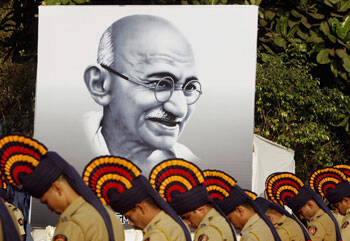Independence for India
June 21, 1947
The simultaneous announcement in London and New Delhi on June 3 of a plan acceptable to all parties for the transfer of power to Indian hands has resolved, by a masterly compromise, the hitherto insoluble problem of Indian independence. Great Britain had announced last February that she intended to end her responsibility in India by June, 1948 and has now given practical proof that India has complete freedom to govern herself. The Hindu Congress Party, representing over two hundred million of the population, has reluctantly yielded its position for a united India and agreed to the creation of Pakistan, an independent and sovereign Moslem state. The Moslem League, with over ninety million adherents, while winning its long and intransigent fight for partition, has consented to the partition of Bengal and the Punjab, which up to now it has insisted should be incorporated into Pakistan. The surprise move, which brought great satisfaction to the English people generally, has been the offer of dominion status to the new states of Pakistan and Hindustan. This will be made effective by the middle of August. This offer was introduced as a means of speeding up the transfer of power, but once the British have definitively moved out of India, the new states will be free to withdraw from the Commonwealth if they so wish.
This brilliant solution of the Indian political crisis is but the first step. There remains the immediate task of arranging for the mixed provinces of Bengal, the Punjab, Baluchistan, the Northwest Frontier and the Sylhet District of Assam to decide by vote which of the two states they will join. The 500-odd Princely States are left free to form an independent union or to join one of the new states. There is the further long-range task of framing constitutions and creating competent political machinery for self-government. The magnitude of the problem arises from the fact that India is a subcontinent with over 400 million people of different races and religions, who for the first time will be governing themselves without British aid. It will be the greatest democratic experiment in history. Already Mohammed Ali Jinnah, leader of the Moslem League, has pledged protection to minority groups in Pakistan without distinction of caste, creed or sect. Recently, too, the predominantly Hindu Constituent Assembly of the current Interim Government (from which the Moslem League has abstained) abolished untouchability in any form. It seems quite evident, however, that Moslem Pakistan will enter the political orbit of the Islamic world. It was on this ground that Indian Communists opposed partition, seeing in it a plan to unite the Moslem nations of the Near and Far East against the Soviet Union, which is separated from India only by the weak nation of Afghanistan. India faces a long, hard road, and on her fate will depend in great measure the stability of the Far East.
Future of the Church in India
July 5, 1947
With the granting of Dominion status to the new states of Hindustan and Pakistan, the Church in India will enter upon a new era. Many Catholic leaders there take an optimistic view of the future, without, however, minimizing the difficulties that lie ahead in the transition period. Catholics at present number close to five million, about one-eightieth of the population, but the conversions have been almost entirely from the aborigines and outcastes. The Hindu castes and the Moslems have barely been touched, since the Hindu loses caste on becoming a Christian, while the Moslem everywhere has been slow to accept Christianity. Furthermore, with the rise of national feeling, the Hindu Congress Party has endeavored to intensify the Hindu religion as a basis of political unity, associating Christianity with western rule and culture. With the departure of the British, however, the predominantly native clergy and sisterhoods and the supra-national character of the gospel will do much to dispel this fear. The Church faces another obstacle in the fact that its members, for the most part, are scattered in pockets throughout the vast subcontinent and are further divided by racial differences. To meet the situation, the hierarchy in 1944 formed the Catholic Bishops Committee of India for achieving unity of action on a nation-wide scale, along the lines NCWC in this country. It has also given a strong impetus to the Catholic Action movement among its laity. The immediate concern of the Church is to secure protection for the rights of religious minorities in the new constitutions. The prospect is favorable, since each of the new states will have within its borders strong minority groups which will insist on constitutional safeguards for their rights.
Indian independence
July 26, 1947
With the appearance of this issue, the Indian independence bill will have passed through the British Parliament, authorizing the formation on August 15 of two new Dominions: the Indian Union (mostly Hindu), with Viscount Mountbatten as Governor General; and Pakistan (mostly Moslem), with Mohammed Ali Jinnah, the president of the Moslem League, as Governor General. Thus will Indias long struggle for independence reach fruition. But the situation is far from promising. While partition was the only solution to a hopeless and critical deadlock, it has left India in a weakened condition. Pakistan, for example, will comprise two territories which are separated by over a thousand miles. On the other hand, five of the largest Princely States seem bent on declaring their independence and will thus form pockets within the territory of the Indian Union. Furthermore, with the departure of the British, the Army and civil administration will lose a large percentage of its experienced top officials. These services, in addition, must be divided between the two dominions according to Hindu and Moslem affiliation, a division which will leave both parts unbalanced and inadequate. The situation, however, was inevitable. England could no longer bear the burdens of empire, and was just as anxious as were the Indians for her withdrawal. The Hindu Congress Party and the Moslem League, up to the present, have whipped unity into their forces by their opposition to the British and to one another. It now remains to be seen whether they can unite the divergent forces within their respective parties to build a stable government and construct a positive economic program. The test of their democracy will lie in the fate of the millions of Indians who are incredibly poor and periodically decimated by famine. The riots, pillaging and arson, which have resulted in thousands of deaths and wholesale destruction of property since last August, rose ostensibly from Hindu-Moslem antagonism, but their deep-seated cause is economic misery and unrest.
India in transition
August 30, 1947
The captains and the kings depart, but the tumult and the shouting have not died, in India. The first days of freedom are clouded with the smoke of burning homes as Hindu and Moslem fight and die in the streets of Indias cities. This is tragic, but understandable; it is the almost inevitable concomitant of a revolution. During the revolution, the leaders have to set their aims high. Bargaining with a superior power, they are cer¬tain to have to compromise. In the meantime, they must unite their people behind them in asking for the maxi• mum. When the settlement comes, there are those who, not having the responsibility of achieving some kind of agreement, will look on all compromise as betrayal. In India, the long and bitter struggle between Moslem and Hindu has aroused passions that will not easily die down. Moslem minorities in the Dominion of India, and Hindu and Sikh minorities in Pakistan find themselves isolated amidst a hostile population. Pandit Nehru and Mohammed Ali Jinnah are united in the effort to reo store peace. Mohandas Gandhi, with characteristic courage, took up his residence in the ravaged Moslem quarter of Calcutta, and faced down the Hindu youths who were seeking Moslem blood. "It is not me but my corpse that will be taken out of here,” he said. And Nehru, broadcasting to the people, urged a cancellation of the past: "It would serve little purpose to go into this long story. We began our new life from August 15." There is no reason to despair of India or Pakistan; they would Dot have come into existence had there Dot been those among their people who know the need and the ways of freedom.








